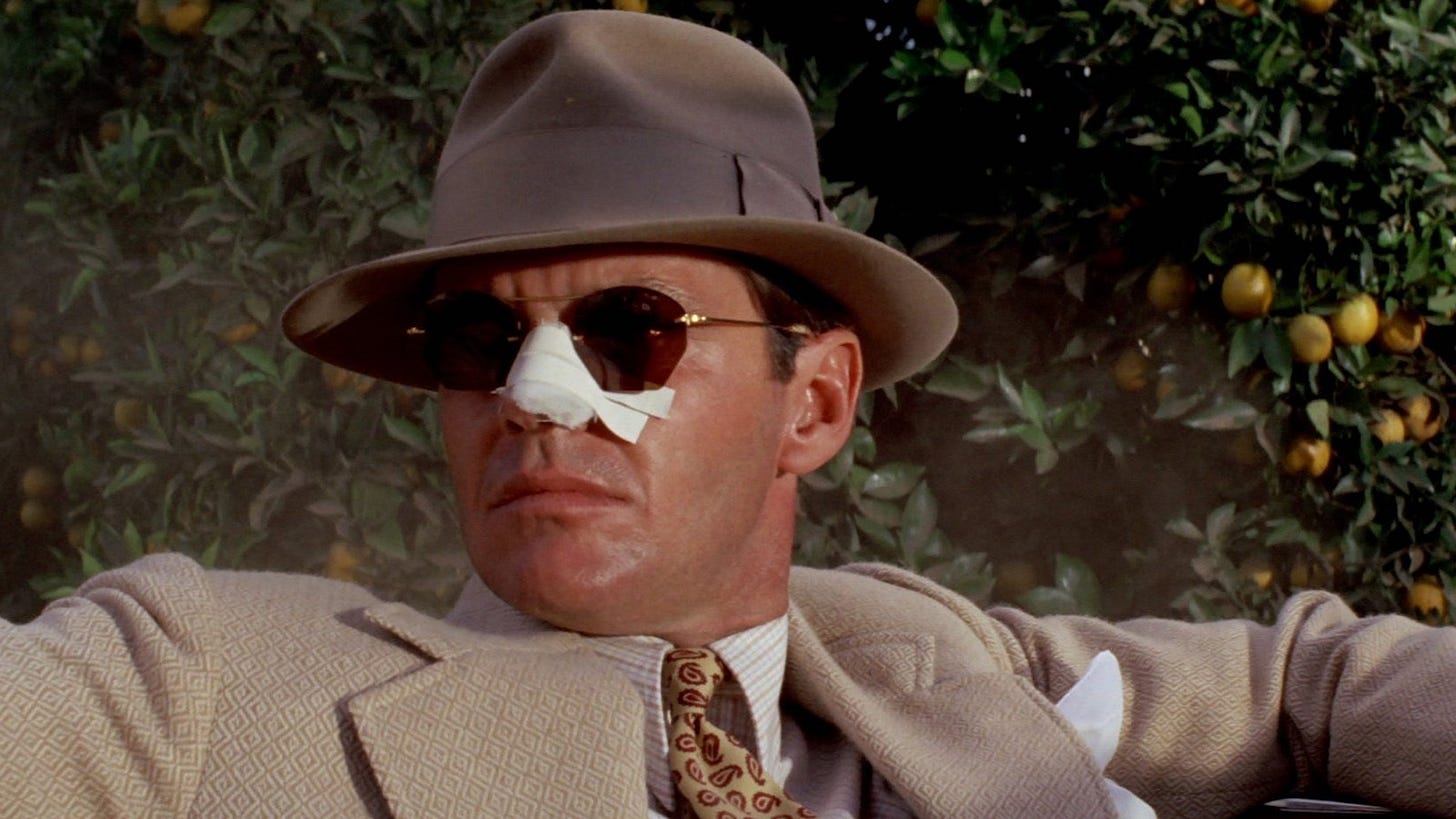‘Well, to tell you the truth, I lied a little’
#36 - ‘Chinatown’
Chinatown is a film out of time. Ostensibly, it takes place in Los Angeles in the 1930s. It is in keeping with many noir tales set in this approximate time and place that came before and would come after. But its aesthetic and its characters feel unmoored from any specific era.
When J.J. “Jake” Gittes tails Evelyn Mulwray to a house and peers in on Evelyn comforting the mysterious young woman at the heart of the mystery Gittes has unwittingly found himself unspooling, in sets a disorienting sensation. We are meant to be puzzled by Evelyn’s association with the young woman, of course. But the house itself - the very structure to which Evelyn has gone - feels too new and too modern for this era.
We peer through the window with J.J., losing the suit-and-tie anchoring of a world-weary private investigator, and we might as well be looking through the window of any house anywhere in the 20th century United States.
This timeless dynamic does not extend to the film’s sense of place. Chinatown is defined by its location, Los Angeles. It is bright - so sun-soaked that it feels like it should come with a complimentary pair of its star’s signature sunglasses. It takes its protagonist all over the topographical features of Southern California, from the Pacific Ocean to orange groves and to the burgeoning suburban sprawl and man-made waterways in between.
Its vibes are universally American, but its place is distinctly Angeleno - a combination that is perfect for a country grappling extra hard with its identity, an acute flare-up of a chronic condition stretching back to the founding.
Geographically, Los Angeles is one of the places where the American frontier literally runs out. More specifically, 1930s Los Angeles, a place growing rapidly and being demographically transformed by Dust Bowlers, is in the process of being civilized, of being established in its near-current form.
This process has not been completed, of course. Indeed, what Jake, and by extension us, bear witness to is the head-on collision of civilization and frontier justice, which is another way of saying no real justice at all.
Jack Nicholson’s Gittes seems to float through this world wryly and warily, as if he himself is going to be swept up and spit through a culvert carrying precious water at some point. He has all this time to tail Hollis Mulwray from land to sea and to get involved in an affair with Faye Dunaway’s Evelyn. He is trying to do his job - solve a mystery - but he doesn’t really understand the urgency of the game in which he has become unwittingly involved.
There is, of course, the sordid battle over water rights - a dynamic still present in California to this day - but the real struggle here seems to be about simply making a lie - making outright theft - in to truth. Evelyn’s father Noah Cross, played by the great John Huston, is as depraved as can be, but, in contrast to Jake, he knows the urgency of the game he is playing. He fits neatly in to the American tradition of myth and reinvention, and, out West at least, he seems to know that this is his moment to, in the parlance of Deadwood, agree upon a lie - to seal cement his power.
Cross’ figure makes one think of Jay Gatsby - who failed in his attempt at reinvention - and of The Man Who Shot Liberty Valance. This is his version of the legend becoming fact, after all. But he, of course, is not our lens for the film. It is Jake who frames everything and who is left to make sense of all that he has been swept up in, largely by accident.
And it is through him that Chinatown becomes a film very much of the 1970s. At its core, it is about disillusionment. It ponders how we are possibly supposed to make sense of these obfuscated power struggles - indeed, if we even can make sense of them.
This must have been quite personal to director Roman Polanski. He survived the horrors of Nazi-occupied Poland as a boy by hiding his Jewish identity. In 1969, his fiance Sharon Tate, more than eight months pregnant at the time, was murdered by the Charles Manson family - an event that is emblematic of the innocence and idealism of the 1960s being supplanted by violence and cynicism. These are events that make one person feel small.
Polanski, perhaps in part because he is an abusive monster in his own right, seems incapable of making sense of it all.
When Evelyn begins to reveal the truth to J.J., she slams her head in to the steering wheel of her car. The horn blares for a moment. For a film that is bright and hazy and often feels like it is being delivered in one long hushed tone, it is an arresting moment. Here is the truth, at last.
Later, during the film’s conclusion, that horn blares again. The police have gunned down Evelyn. It’s even more arresting this time because of her dead weight. As it drones on, J.J. is whisked away, free of his entanglement in the case, but with no satisfaction gained.
“Forget it, Jake,” a friend says to him. “It’s Chinatown.”
It’s a cryptic sentiment for a film that solves its nominal mystery but doesn’t even bother trying to process the bigger truth at its heart. Even if we know the real story, out there, there isn’t any time to stop and consider what it means. There is only inexorable progress, and the dead who have gotten in the way.



